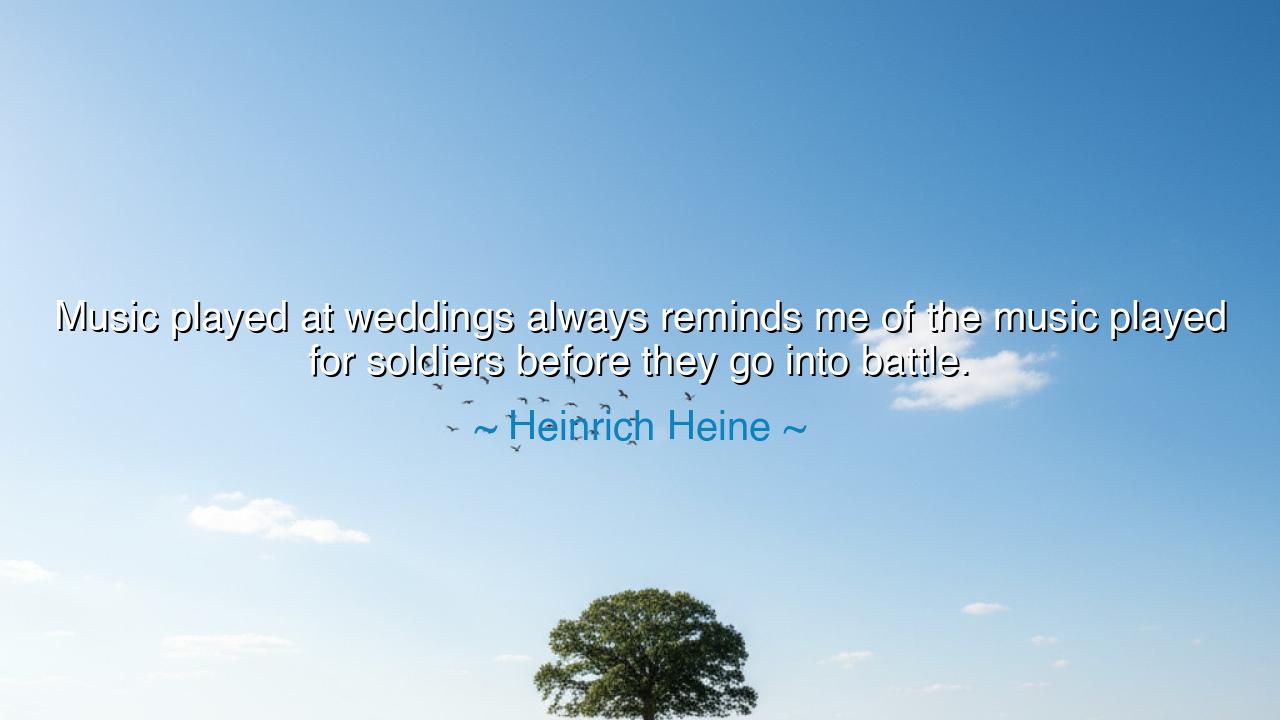
Music played at weddings always reminds me of the music played
Music played at weddings always reminds me of the music played for soldiers before they go into battle.






Listen, children of the ages, to the voice of Heinrich Heine, who observed with piercing insight: “Music played at weddings always reminds me of the music played for soldiers before they go into battle.” In this profound utterance lies the recognition of the dual nature of human ceremonies. The wedding, that most sacred of unions, is also a passage, a threshold where the soul steps into unknown terrain. The music, sweet and triumphant, carries within it the anticipation, the nervous courage, and the unspoken commitment that every human heart must muster when facing life’s irrevocable decisions.
Heine’s words reveal the poetic symmetry between the sacred and the martial. Just as the soldier hears drums and trumpets that stir both fear and valor before battle, so too does the bride and groom hear melodies that awaken both excitement and trepidation. The marriage, like the battlefield, is an arena of risk, of profound transformation, where hearts are tested, and vows become swords of intention. Here, the music is not mere ornamentation; it is the herald of courage, calling forth the spirit to face what is yet unseen.
Consider the legendary tale of Romeo and Juliet, whose union was fraught with danger in a city torn by feud. Though their love was tender and fervent, their steps into the public acknowledgment of their bond were perilous. The music of the wedding, had it played, would have stirred hearts as the call to arms stirred warriors—hearts brimming with hope, yet shadowed by the inevitability of trial. Heine’s reflection captures this ancient truth: that joy and fear walk hand in hand, and every rite of passage demands valor.
Even in history, the grand weddings of kings and queens carried this duality. When Catherine of Aragon married Henry VIII, the orchestras that filled the halls could be likened to a battle’s fanfare, heralding the irrevocable commitment of two souls under the scrutiny of all the realm. Every note summoned both anticipation and resolve, echoing Heine’s insight that music in moments of great transition is both a celebration and a summons to courage.
Thus, we learn from Heine that the sound of ceremonial music is not merely pleasure for the ear, but a stirring of the soul. It reminds us that every union, every significant turning, carries the weight of responsibility, the possibility of struggle, and the demand for courageous hearts. In the echoes of trumpets or strings, the ancients whisper: face life as the soldier faces the battlefield—with boldness, with love, and with full awareness of the journey before you.
Remember, children, that in the joyous strains of a wedding or the solemn call to arms, the human spirit is called to rise. Music binds the heart to the moment, and Heine’s timeless observation teaches us to embrace both the beauty and the challenge that every great passage of life holds.






AAdministratorAdministrator
Welcome, honored guests. Please leave a comment, we will respond soon